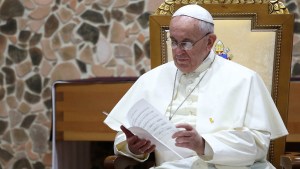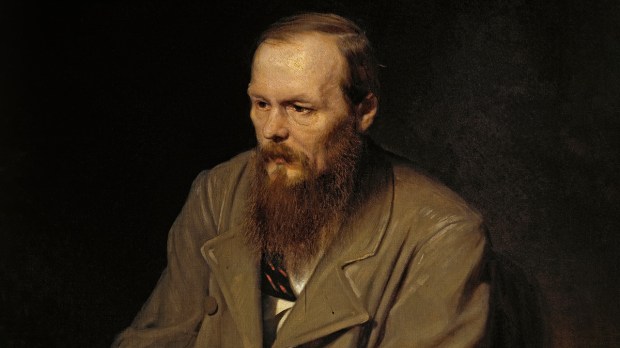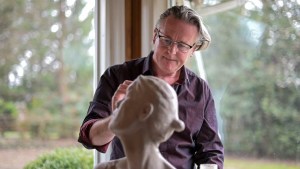November 11, 2021, marks the 200th anniversary of the birth of Fyodor Dostoevsky, a giant of world literature and a Christian of profound faith. His stories—passionately energetic, psychologically perceptive, philosophically profound, religiously stirring—have influenced many giants in their own right, including Nietzsche, Freud, James Joyce, Albert Einstein, and René Girard. He is rightly considered one of the greatest writers who ever lived.
In honor of his work, and as an invitation to explore his writings, here are 20 “rules for life”—one for each decade since his birth—inspired by the writings of Dostoevsky.
1. Take God seriously—because without him, everything is permitted.
In The Brothers Karamazov, the young skeptic Ivan proposes an idea that has haunted readers ever since: without belief in God and immortality, “everything is permitted.” Man may still be good without God, but he no longer finds any ultimate ground for morality. Dostoevsky prophetically saw, before Nietzsche articulated the same idea, that godlessness was opening up an abyss “beyond good and evil.”
2. Take the problem of evil seriously.
But Dostoevsky, through Ivan, also makes one of the most powerful arguments against God’s existence there is: the suffering of innocent children. If that’s the high price for admission, Ivan concludes, he respectfully returns his ticket. Dostoevsky offers a response through the faith of Ivan’s brother Alyosha—especially in the novel’s powerful, hopeful closing scene—but only after facing the problem head on, and challenging us to do the same.
3. Embrace the freedom and adventure of faith.
In “The Grand Inquisitor,” a masterpiece within Dostoevsky’s masterpiece, Ivan imagines the Church as a humanist institution that soothes man and relieves him of the burden of freedom—even if it means arresting Christ upon his return. So much could be said about this rich, complex story, but a basic lesson is this: the call to follow Christ is a call to spiritual adventure, not spiritual mediocrity. Mercy can’t deaden what Kierkegaard called “the dizziness of freedom.” We need both.
4. Offer a kiss when only a kiss will speak.
At the close of “The Grand Inquisitor,” Alyosha imitates the gesture of the silent Christ in the parable, offering a kiss to his anguished brother. Sometimes, all the explanation, discussion, and argumentation in the world won’t seem to get us anywhere with someone we love. All we can do is refuse to give up on them, be present to them, and embrace what is good, true, and beautiful in them.
5. Do not fear the crucible of doubt.
Dostoevsky knew that faith does not mean stifling the life of the mind; on the contrary, in the year of his death, he wrote, “It is not as a child that I believe in Christ and confess him. My hosanna has passed through a great crucible of doubt.” The Christian must be unafraid of the hard, difficult questions that arise in life; in fact, questions can ultimately forge and strengthen faith.
7. Be clear-eyed about the dark side of man’s nature.
A theme of so much of Dostoevsky’s work is that—the dream of the Enlightenment notwithstanding—dark forces are constantly at work in human life: irrationality, self-torment, addiction (Dostoevsky himself wrestled with gambling), cruelty, rage, and violence. This theme is on powerful display in Notes from Underground—a brief and excellent entry in Dostoevsky’s corpus—which has arguably the greatest opening line in all of literature: “I am a sick man . . . I am a wicked man.”
8. Be suspicious of the world’s “crystal palaces.”
Dostoevsky’s Underground Man thus proposes that if a “crystal palace” of harmony, rationality, peace, and progress were ever built (an image inspired by a real-life structure in London), man would respond with boredom and resentment and, in a kind of frenzy, start sticking pins in his neighbor before pulling down the entire thing. Dostoevsky’s warning about attempted utopias was vindicated time and again in the 20th century—the bloodiest on record in human history.
8. Don’t break the moral law, or it will break you.
In Crime and Punishment, Raskolnikov—convinced there are “extraordinary” men who can transgress the moral law (again anticipating Nietzsche)—murders an elderly pawn broker, only to be plunged into deep mental and spiritual anguish. The riveting story, which has inspired dozens of adaptations, films like Rope and The Machinist, and a recent stage play, offers a compelling portrait of the fixed reality of moral truth and the spiritual effects of violating it.
9. Avoid hell; it’s worse than you ever imagined.
The lampooned image of hell as a place of eternal flames and pitchforks is not nearly as terrifying as the definition given by Father Zosima, a spiritual master and elder who guides the youngest Karamzov: hell is “the suffering of being no longer able to love.” It is total and eternal lovelessness. This is not simply a spiritual punishment that may or may not await us after death; it is a spiritual state that begins in life. Strive instead toward love, which is the joy of heaven.
10. Love—but know that love is a harsh and dreadful thing.
But what is love? As Father Zosima puts it: “Love in action is a harsh and dreadful thing compared with love in dreams.” The latter is “greedy for immediate action, rapidly performed and in the sight of all,” while the former is “labor and fortitude.” We should not be overly sentimental about love; it is to will the good of the other, which can be as hard-edged as it is difficult.
11. Hoist the responsibility for sin on yourself.
Zosima also offers the following challenge: “Take yourself up, and make yourself responsible for all the sins of men. . . . It is you who are guilty on behalf of all and for all. Whereas by shifting your own laziness and powerlessness onto others, you will end by sharing in Satan’s pride and murmuring against God.” Rather than picking at the splinter in our brother’s eyes, we must attend to the log in our own—which may, in fact, be a source of countless splinters around us.
12. Love all of creation and see its glory.
Zosima talks not only of loving our fellow human beings but of loving all of creation. In two passages directly referenced in Terrence Malick’s masterpiece The Tree of Life, we read: “There was so much of God’s glory around me: birds, trees, meadows, sky, and I alone lived in shame. I alone dishonored everything, and did not notice the beauty and glory of it all.” “Love all of God’s creation, both the whole of it and every grain of sand. Love every leaf, every ray of God’s light. Love animals, love plants, love each thing. If you love each thing, you will perceive the mystery of God in things.”
13. Accept great suffering as the lot of great men.
In the midst of his self-torment, Raskolnikov in Crime and Punishment offers a profound insight: “Pain and suffering are always inevitable for a large intelligence and a deep heart. The really great men must, I think, have great sadness on earth.” The way of love is also the way of the cross—and gold, as the Scriptures tell us, is tested in fire.
14. Save the world with beauty.
“The world will be saved by beauty.” This line from The Idiot has special resonance today. People are deeply suspicious of claims about what is true and what is good; thus, leading with beauty is a powerful way to reorient someone’s mind and heart toward salvation. And wherever there is beauty, there is truth and goodness too.
15. Be astonished at everything.
In his short story “Bobok,” Dostoevsky writes: “It’s much sillier to be astonished at nothing than to be astonished at everything.” As we grow older and more cynical, we learn to act unimpressed by things. But the wise man is astonished by everything—even small, seemingly insignificant things. Even that there exists anything at all rather than nothing should come as a surprise.
16. Periodically remind yourself that you’re a fool.
A similar gem of wisdom can also be found in “Bobok”: “The wisest of all, in my opinion, is he who can, if only once a month, call himself a fool.” Just as we learn to act unimpressed by the world, we also learn to act as if we have all the answers to its problems. But the wise man humbly sees that, even on his best day, he can fall flat on his face in spite of all his good advice.
17. Remember your death—and don’t waste your life.
In The Idiot, Prince Myshkin tells the story of a man sentenced to death by hanging, only to be reprieved 20 minutes later. The scene is based on an episode in the life of Dostoevsky himself, who was once sentenced to death by firing squad before having his sentence commuted. As the man stands by the scaffold and the moment of truth approaches, he longs to return to life, “so as to waste not a single instant.” One day, you will be that man—perhaps as soon as tomorrow—so don’t squander your time.
18. Puzzle out the mystery of man.
At 18 years old, Dostoevsky wrote to his brother: “Man is a mystery: if you spend your entire life trying to puzzle it out, then do not say that you have wasted your time. I occupy myself with this mystery, because I want to be a man.” His work is a testament to this search—a thorough exploration of the mystery of man in both his folly and glory, his wretchedness and greatness—and an invitation to us to pick it up anew.
19. Remain with the mystery of Christ.
Dostoevsky ultimately saw the truth of man in the light of the truth of Christ. So profound was his faith in Jesus that he once wrote: “If someone proved to me that Christ is outside the truth and that in reality the truth were outside of Christ, then I should prefer to remain with Christ rather than with the truth.” Fortunately, no such dilemma is necessary, but it offers a compelling test of our love for Jesus, especially for those of us inclined toward abstractions. Christ truly entered into sin and death (as we see in Hans Holbein’s painting of Christ in the tomb—an image that captivated Dostoevsky and that he alludes to in The Idiot), and he truly conquered them in his Resurrection. Will you remain with this truth—even if it costs you everything else?
20. Hope that all shall be well.
Ivan Karamazov describes the healing of the world in eternity—a vision that, for all its beauty, he cannot accept. But the Christian accepts it in hope, even childlike hope: “I believe like a child that suffering will be healed and made up for, that all the humiliating absurdity of human contradictions will vanish like a pitiful mirage, like the despicable fabrication of the impotent and infinitely small Euclidean mind of man, that in the world’s finale, at the moment of eternal harmony, something so precious will come to pass that it will suffice for all hearts, for the comforting of all resentments, for the atonement of all the crimes of humanity, for all the blood that they’ve shed; that it will make it not only possible to forgive but to justify all that has happened.”




